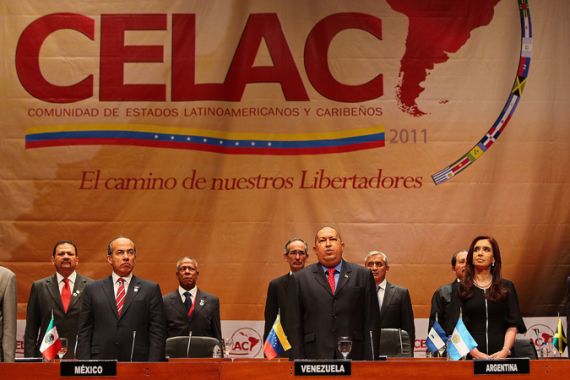Chavez lauds new Latin American alliance
Venezuelan president, battling cancer, appears energetic at founding of 33-member bloc meant to counter United States.

Venezuela’s President Hugo Chavez has exuberantly hosted Latin American leaders in a bid to create a new regional body that is intended to counter the United States.
The Friday inauguration of the 33-member Community of Latin American and Caribbean States (CELAC), which deliberately excludes Canada and the United States, was also Chavez’s biggest moment on the world stage since he underwent cancer surgery in June.
The 57-year-old Chavez, who wants to win re-election next October, warmly welcomed other leaders, including Dilma Rousseff of Brazil, Argentina’s Cristina Fernandez and Cuba’s Raul Castro.
“As the years go by, CELAC is going to leave behind the old and worn-out OAS,” Chavez said, referring to the hemisphere-wide Organisation of American States that leftist nations say is under Washington’s thumb.
|
“Whose bald head is the most elegant? Lula’s or mine?” – Hugo Chavez |
Chavez called the foundation of CELAC an achievement 200 years in the making, the realisation of the ambitions of independence hero Simon Bolivar.
“Only unity will make us free,” Chavez said to applause at the opening ceremony. “This is the path: Unity, unity, unity!”
Al Jazeera’s Dima Khatib in Caracas said the leaders were trying to send a message to the US that they are not Washington’s “backyard anymore”.
“For some of them, there might be a little bit of anti-Americanism but for many – and they have said it – this is just a very important step for them to be together,” she said.
“Usually all these countries, whenevever they would have met, it would have been the US and Canada. This is the first time they’re doing it without these two countries, and their aim is to foster regional integration.”
Chemotherapy joke
The new group has lofty aims including the creation of a regional reserves fund for economic crises and a body for human rights monitoring.
But critics say it unnecessarily adds yet another acronym to the plethora of overlapping, “alphabet soup” organisations that already exist around Latin America.
Exuding joy at the event, Chavez spoke at length and even made light of his health problems – a sensitive issue that will play a role in his electoral fate next year.
“Whose bald head is the most elegant? Lula’s or mine?” he joked of the chemotherapy treatment he and former Brazilian leader Luiz Inacio Lula da Silva have undergone.
Chavez also showed off the artistic skills he developed during his recuperation.
Argentina’s Fernandez shed a tear when Chavez presented her with a large painting he did depicting himself with her late
husband.
“It is the best picture I’ve ever painted,” he said.
US disengagement
The countries of CELAC have nearly 600 million people and comprise the world’s number one food exporter.
They have a combined GDP of about $6 trillion – roughly a third of the combined output of the US and Canada.
 |
| Nicaraguan President Ortega called CELAC a “death sentence” for the Monroe Doctrine [EPA] |
Cuba, suspended from the Washington-based OAS in 1962, is a CELAC member. Analysts say the new body shows the wish of Latin America and the Caribbean to move out of the shadow of Washington.
“This has been aided by a progressive disengagement from the region by the US since the end of the Cold War, allowing other countries – most notably China – to increase their footprint in primarily economic, but also political terms,” said Robert Munks of global think tank IHS Janes.
Chavez’s fellow leftists gave the meeting an immediate political slant.
“It’s the death sentence for the Monroe Doctrine,” said Nicaragua’s President Daniel Ortega, referring to a hated 19th- century US policy that many Latin Americans regard as justifying meddling in their region.
More conservative leaders, though, are believed to have watered down the summit’s final declarations. The next
meeting will be hosted by Chile’s right-wing government.
The two-day summit was meant to be held six months ago to coincide with Venezuela’s 200th anniversary of independence but was called off at the last minute as Chavez recovered in Havana following surgery to remove a baseball-sized tumor.
Chavez says he is cured after four chemotherapy sessions, although cancer specialists say it is too early to make such a call. Privately, people close to his administration say there remains great concern about the secrecy around his health.
“I feel good, but of course, slowly by slowly putting the brakes on,” he said. “It’s a new Chavez, more patient.”
Chavez’s health is the great unknown in the 2012 election. A newly united opposition believes it has the best chance yet of unseating him since he won power in a 1998 vote.
One opposition candidate, Maria Corina Machado, urged supporters to greet the CELAC leaders late on Friday with a
noisy “cacerolazo” – the beating of pots and pans which is a traditional form of popular protest here.
Analysts said that right now Chavez looks a good bet to win in 2012, albeit by a narrow margin. He still has widespread support among the poor, while an economic upturn and heavy state spending have been fuelled by oil.
But they warned that many unknown factors – like his health and the strength of the opposition campaign – could change the picture before October 7.